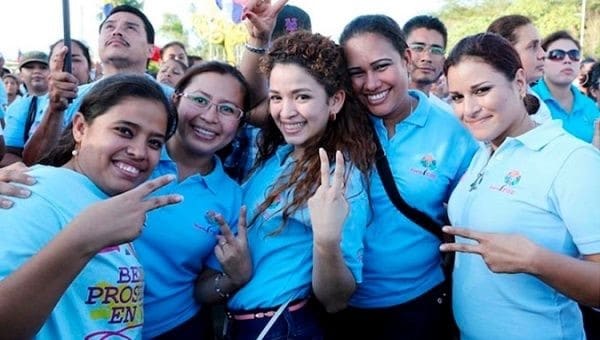Nicaragua in Fifth Position For Gender Equality in The World


Orinoco Tribune – News and opinion pieces about Venezuela and beyond
From Venezuela and made by Venezuelan Chavistas

The World Economic Forum (WEF) released the Global Gender Gap Index (GGGI) for the year 2018 Monday, in which Nicaragua ranks highest on the list for the Americas – in fifth position, alongside Nordic countries; Iceland, Norway, Sweeden, and Finland.
Nicaragua is the top country in the Americas in the 2018 GGGI, and it is the only nation outside of the Nordic region to be part of the top five ranking countries. Nicaragua have an 80.9 percent rate of equality between men and women, according to the Index. The global average is at 68 percent, a “marginal improvement over last year.” However, the data also suggests that it will take 108 years to eliminate the general gender gap.
The GGGI “was first introduced by the World Economic Forum in 2006 as a framework for capturing the magnitude of gender-based disparities and tracking their progress over time,” according to the WEF 2018 report. This year benchmarks 149 countries “on their progress towards gender parity on a scale from 0 (disparity) to 1 (parity) across four thematic dimensions—the subindexes Economic Participation and Opportunity, Educational Attainment, Health and Survival, and Political Empowerment.”
The publication also highlights that Latin America and the Caribbean is the third region with the highest gender equality in the world, reducing its gap to 71 percent, during 2018. The country that has lead the ranking in the GGGI is Iceland, who has reduced its gender inequality by 85 percent.
<img src=’https://pixel.adsafeprotected.com/?anId=928426&advId=us&campId=&pubId=&chanId=27524&placementId=is’ height=’1′ width=’1′ alt=”>

According to the Nicaraguan Vice-president, Rosario Murillo, this is “Good news and (are) part of the Victories of the Free Homeland, Victories of the Dignified Homeland, and Victory of the Homeland that we want more and more United.”
The fact that the Central American country is on the top of the list in its region of the fight against gender inequality is because “Nicaragua, (is) a Latin American country committed to gender equity,” according to Murillo.
In 2006, Nicaragua was in 62nd position in this same ranking. “We were there when we came to the government. (From there) to the fifth place in 2018, we continue to maintain gender parity, that is, gender equality in ministerial positions and (Nicaragua) has one of the highest proportions in the world of women in parliament,” stated Vice-president Murillo.
According to Vice-president Murillo, Nicaraguans, under the Sandinista government, have been “working together for justice, working together for dignity in our lives, working together for harmonious coexistence, working together to implement a state policy of reconciliation and peace, working together, women and men, families.”
You must be logged in to post a comment.